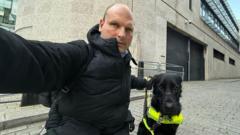
Sean Dilley, a guide dog handler for 25.5 years, is sharing his experiences of discrimination and the challenges faced by people with disabilities. After decades of using guide dogs, he is increasingly frustrated by repeated instances of service refusal and online hostility.
Recently, Dilley was denied entry to a restaurant, initially under the pretext of potential allergies – which he notes is unlawful. When challenged, the restaurant changed its excuse to lack of space. This incident is just one of many similar experiences he has encountered throughout his life.
Dilley became completely blind at 14 due to hypertension and eye conditions. Since 1998, he has worked with four guide dogs – Brandy, Chipp, Sammy, and currently Shawn – who have been crucial to his independence and mobility. Each time he is refused service, he feels his freedom is stripped away.
The discrimination extends beyond physical spaces. On social media, Dilley has faced alarming levels of abuse when sharing his experiences. He has received threats of violence, including people threatening to harm his guide dog, and even disturbing personal attacks. One user suggested violence against his mother, while another posted mocking “victim cards”.
In the UK, the Equality Act 2010 makes it illegal to discriminate against disabled individuals with guide dogs in businesses and services. However, Dilley points out a significant legal loophole: while taxi refusals are a criminal offense, other service refusals are civil matters, placing the burden of proof and legal action on the disabled individual.
The emotional toll of constant discrimination is profound. Dilley compares the feeling to being robbed, describing a gut-wrenching sensation of being systematically marginalized. He is particularly frustrated by the lack of empathy from people who fail to understand that disability could potentially affect anyone.
After years of publicly sharing his experiences and facing increasing online hostility, Dilley has reluctantly decided to stop actively advocating for equal treatment. The combination of service refusals and aggressive online responses has become too overwhelming.
His experience highlights broader societal issues of accessibility and understanding for people with disabilities. Despite legal protections, many businesses and individuals continue to discriminate, creating significant barriers for those with guide dogs.
Dilley’s narrative is a powerful reminder of the daily challenges faced by people with disabilities and the ongoing need for greater awareness, empathy, and genuine inclusion in society. His decision to step back from public advocacy is a poignant commentary on the exhausting nature of continually fighting for basic rights and respect.








